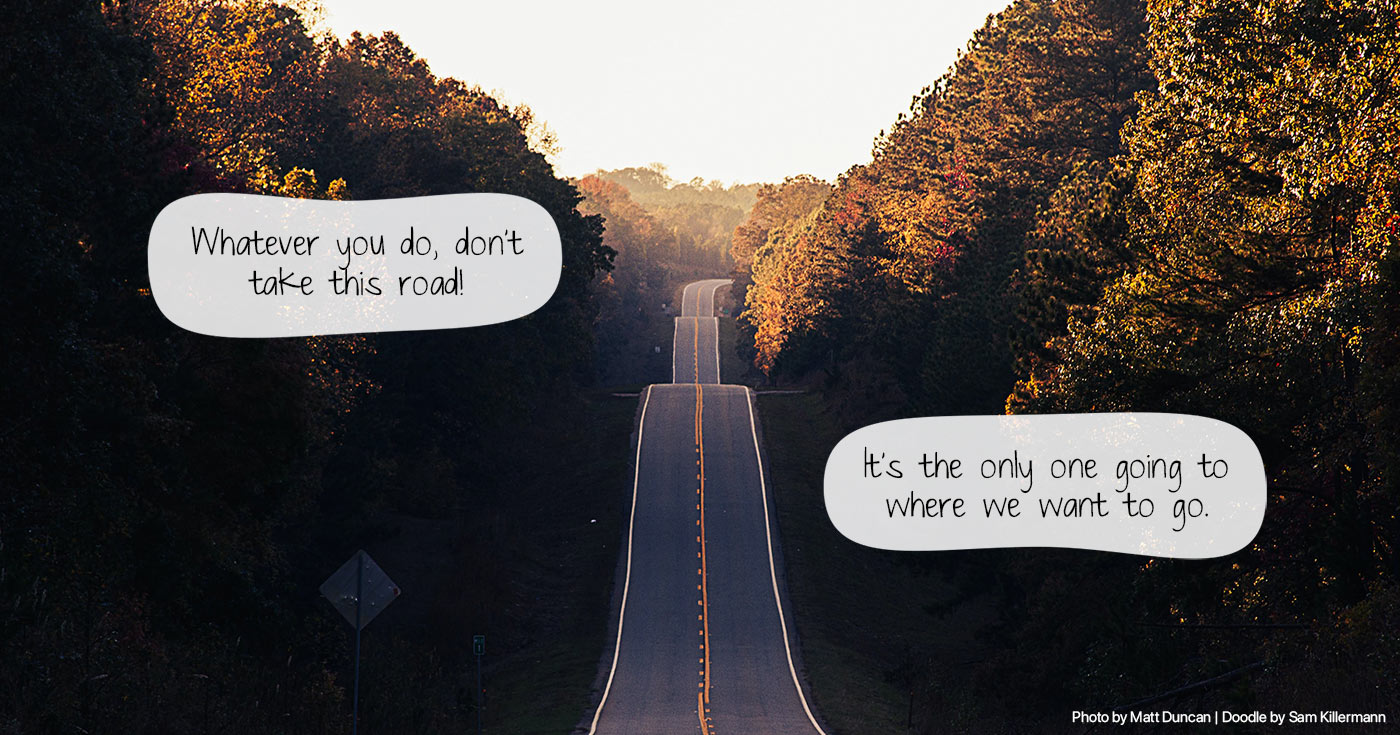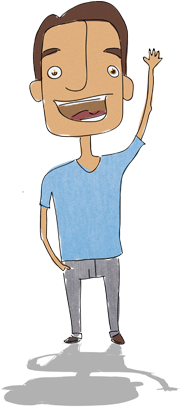Back before Google Maps, if we were dropping a friend off at their house for the first time, we’d have to pay attention to how we got there. Remember the turns, street names, landmarks. “I turned left at that gigantic weeping willow. Okay, on the home I’ll turn right when I see it.”
Nowadays we can be completely lost in thought, listening to a podcast, oblivious to where we are, wherever we’re going. Arriving there as if by magic, with not account for the twists and turns it took to get us there, we just type our home address into Google Maps – beep boop – and have the path home read aloud to us.
The same is true for how we get people to where we are. We no longer have to explain it, using the little tricks we’ve learned from our friends who got lost in the past (“You’ll think you missed the turn, but keep going. I’m in the middle of nowhere.")
Now we just give people the final destination, they tap it into their phone, and they get here without issue. Every time.
Magic.
But the same can’t be said for the directions we followed on the way to where we are ideologically. The twists and turns of belief that led to us believing what we believe now. All the things we once tried to do ourselves – or demand others do – to be good people, that led us into dead end after dead end, until we got to what we’re doing now.
How did you get here?
Over time, there are likely dozens (if not hundreds, thousands) of crossroads in your journey that led you to the actions, attitudes, and beliefs guiding you now (your social justice compass, pointing you toward equity).
When it comes to concepts like social justice, gender, sexuality, race, identity, and more – how did you end up knowing what you know now? (Instead of what you thought you knew before.)
What were the things you were sure were healthy, that you now see as unhealthy? The things you saw as fair, that you now see as oppressive? The things you didn’t see at all, that you now see everywhere?
What were the behaviors you used to celebrate, that you now avoid? The actions you now see resulted in harm, but you thought were for the good of others?
Every one of those Thens that became a Now represent a change in direction on the path that got you here. A road sign you noticed. A wrong turn you corrected. A gigantic weeping willow you made a mental note of.
Bad Directions
A lot of people seem to think all we need to do to get closer to the destination of social justice is tell everyone where they are now. No explanation of how they got there. “Just get here. Now.”
I see this all the time.
Someone will say, “It’s harmful to believe X," while not mentioning that they used to believe X themselves (often until literally today, the day they’re admonishing it), and all the ground they covered moving from X to Y.
Sometimes it’s even less helpful.
People will tell others that they should not follow their path. That the directions they took are somehow problematic, or oppressive, or harmful (despite getting them to where they are now).
People will say A led me to B. And B led me to C. But A and B are harmful, so skip those and go to C. This is the social justice version of, “Do as I say, not as I did.”
For example, I’ve seen this a lot with the Genderbread Person. Someone will say, “This really opened my mind when I first saw it, but now I see that gender is way more complex than this, and this graphic is problematic, so stop sharing it.” If it got you to where you are, might it help others get there, too? Might that initial understanding have helped you unlock the deeper understanding later? Maybe I’m taking this one too personally?
For a non-personal example, I’ve seen lots of people saying, “Anything short of arguing for abolishing the police is oppressive.” To me, I see this as a clear A to B to C, where the person is skipping their own A and B. They went from A (police are good, necessary, and protect us) to B (police are a force of oppression, and likely cause as much harm as the good they do) to C (abolish the police, anything short of this racial violence). It’s going to be a bumpy ride trying to get someone to go from A to C without at least a pit stop at B. And, if the data I collected here are any indicator, people are very A: most aren’t ready to defund, let alone abolish, the police.
Even worse yet, I’ve increasingly been seeing people outright reject the idea that they ever were anywhere but where they are now, and anyone who isn’t here already is lost forever.
That is, viewing whatever someone’s current stance on an issue, or understanding of a concept, as somehow detached from time or evolution or change. Someone acting as though they’ve always believed X (when X is “good”, or socially-just) – there was no road to get them there. They were born there. On the flipside, if someone doesn’t believe X, there is no road that will possibly get them to X.
This is a particularly dogmatic manifestation of social justice activism. It’s also what led to me writing this article exploring one prickly reason why some anti-LGBTQ people don’t change their views. It says that the people who aren’t already here don’t deserve our guidance to get here, and instead deserve punishment for not being here already.
But what would good directions look like? How can we be helpful, if we want to be helpful?
We need to remember the directions we followed.
If we’re in a place that we want to guide others to, we need to remember how we got here.
We need to remember the roads we took to get where we are. What were the bumps we hit? Where did we get lost? What street names, landmarks, or compass directions helped us find our way?
For social justice activism, this will look like all the things we had to learn and unlearn. All the hackles we had, the fears, the misconceptions. The discomfort we experienced. The perspectives we added to our own.
We didn’t get here by magic. Who guided us? What were the maps we used? What were the wrong turns we made that ended up being shortcuts? What were the correct directions we refused to follow, because we were sure it was a left there (but we were wrong, and that stubbornness lost us precious time)?
Here, think of all the books and articles and essays you read. The workshops you attended. The voices you listened to. The times you stepped outside your comfort zone. The people who challenged you, guided you, reassured you, questioned you, pushed you.
We need to be mindful of how long it took us to get here. It might be quicker for other people if we spent a lot of time going the wrong way. We can point out the shortcuts we’ve learned. But it’s still going to take time.
It can be dangerous to hurry, particularly if you’re driving in the dark or down unfamiliar roads. My mom always said, “Don’t make up for lost time on the road.” We don’t want to get a ticket, or, worse, to crash.
There is no Google Maps for Social Justice
There is no Google Maps for activism that allows us to simply give others the destination, knowing they’ll get all the turn by turn guidance they need, perfectly tailored to them – and get ourselves out of all the work that goes into helping them get here.
If we want to get people to where we are, we need to be willing to guide them. Or connect them with other guides if we’re not up for it.
In guiding, we must be cognizant of where someone is coming from. Directions to a destination are only helpful when they consider the origin. I can’t tell you how to get to Austin unless you tell me where you’re coming from. You can’t get someone to a new belief unless you start with what they believe now.
All of this takes effort. It doesn’t happen on its own. It’s not magic. If our goal is to get everyone else (or even anyone else) to where we are now, guiding them is the only way it’s going to happen.
Nobody is getting here without directions. Give them, or get out of the way.
P.S. But maybe our directions are wrong.
After all, not only do we not have a Google Maps for social justice that allows us to magically get everyone to where we are, we also don’t have an app that tells us where we need to go. We haven’t gotten there yet, after all, to the destination of “Social Justice.”
What if we’re heading toward a dead end right now, and we just haven’t hit it yet?
I’m not sure we need everyone to get to where we are – or really anyone. What I mean is that I’m no longer sure that changing hearts and minds is the road to living social justice. I write about this in my book Problematic Activism (and you can read this essay about hearts and minds activism for a glimpse of what I’m talking about here).
I could totally be wrong about this. And if I am, then everything I wrote about above is doubly bad. It’s us creating roadblocks and detours on the road to social justice – actively getting in our own way – instead of giving people directions that will help us get there.
Here are two things I know for sure right now:
One, it was a long, winding, exhausting, and dangerous road that got me to where I am now. I wouldn’t be here if not for countless books and articles I’ve read, literally tens of thousands of conversations I’ve had in almost every state in the US and dozens of other countries, and over a million emails I’ve read from all of you.
Two, if you want to get here, I’m not sure I’d recommend it, but I’d be happy to give you directions. Just ask.


